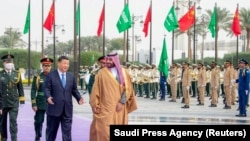Saudi Arabia threw out the proverbial red carpet for Chinese President Xi Jinping for a series of summits that could have lasting repercussions for the United States and other Western nations. In addition, the Arab states that attended the final summit Friday are hoping to participate in Beijing's Silk Road Initiative, linking Asia to Africa via the Arab world. Ultimately, the Silk Road Initiative will also tie into China's Belt and Road Initiative linking China to Europe.
Xi told Arab leaders Friday that the gathering had "worked to strengthen mutual efforts to confront the food, energy and climate crises and is committed to finding political solutions to thorny issues, while maintaining peace and security in the region."
Arab states, including Algeria, which was one of the co-hosts of the China-Arab Summit, appeared to be seeking a financial lifeline from Beijing amid the turbulent economic problems since the onset of the COVID-19 crisis and the resulting global food shortages and price increases.
Timing of meetings crucial, says leader
Egyptian President Abdel-Fattah el-Sissi told Xi and the Arab leaders that the gathering came at a "critical point" in international affairs, given the "multiple crises facing the world" and that a "solid understanding with China" would do much to "help the situation."
Saudi Crown Prince Mohammed bin Salman, who hosted the China-Arab Summit in Riyadh in addition to an earlier bilateral summit and a joint China-Gulf summit, appeared to be interested in increasing economic and technological cooperation with China in addition to political support over tense issues, including Iran and Yemen.
He said that the Arab states look at China with a great deal of interest due to its achievements regarding development and technology that have made it a world leader in these areas and hope to strengthen economic, technological and developmental ties with Beijing in order to improve the economic lot of their own people.
Scholar notes similarities
Egyptian political sociologist Said Sadek told VOA that the China-Arab summit in Riyadh mirrors the U.S.-Arab “security and development” summit that Saudi Arabia hosted for visiting U.S. President Joe Biden in July, along with a large number of Arab leaders. The "three summits with China," he said, "are an effort to diversify relations on the world stage" at a time of "major upheaval" as "Russia challenges the previous world order."
"The Chinese emphasized the strategic importance of defending the Gulf, so it is not only the Americans and the West that are in charge of defending the Gulf States," said Sadek.
Sadek argued that the "Gulf States are not trying to replace the U.S. with China but want to be able to turn to another strategic partner in the event of human rights issues or other strategic factors that prevent the sale of U.S. arms to Arab states at critical moments," as occurred when the U.S. "blocked the sale of drones to the UAE over concerns that they would be used in Yemen."
Washington-based Gulf States analyst Theodore Karasik pointed out that "the agreements signed (at the summits) still need to be executed and conducting (oil) trade in the (Chinese currency) yuan, the process is beginning."
“The Gulf States," he said, "continue the process of diversification that they have been practicing for several decades," and the COVID-19 crisis has "spurred them to act more quickly for recovery, as the geoeconomic center of commerce is moving more to the east."
Paul Sullivan, a Washington-based Middle East analyst with the Atlantic Council, told VOA that the China-Arab summit was "lots of PR and propaganda for China." He argues that "(China) and others are pushing the idea that the U.S. withdrew (from the region), but it hasn't."
He pointed out that many U.S. companies do business in Egypt, Saudi Arabia and other Arab countries, while the U.S. 5th Fleet is based in Bahrain and the U.S. Air Force is at Qatar's Al-Udeid Air Base.
"Chinese investments (in the Arab world)," he said, "are just a sliver of China's overall world investments, most of which are and will remain in Asia."
"The Arabs," he concluded, "should proceed with caution."




